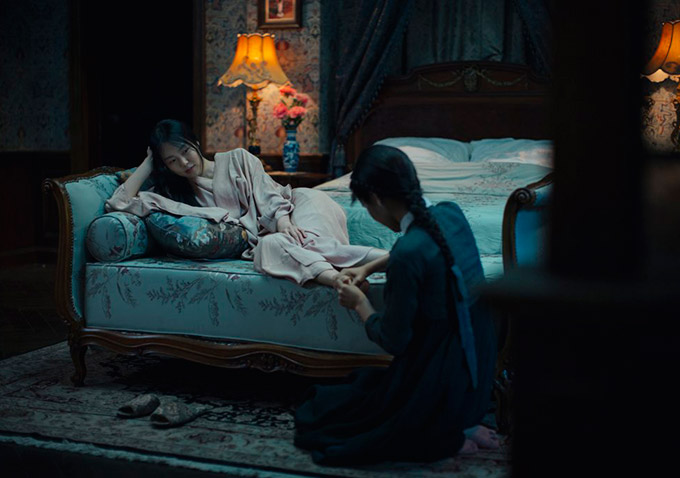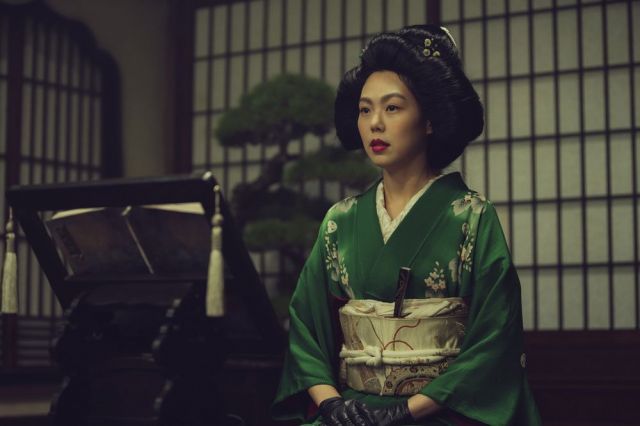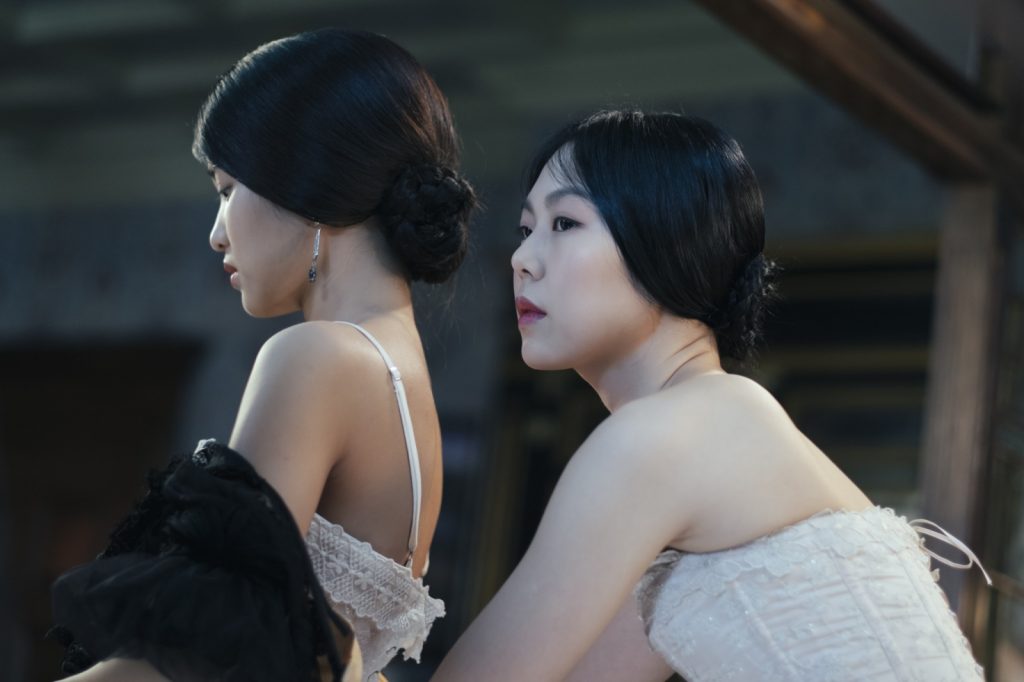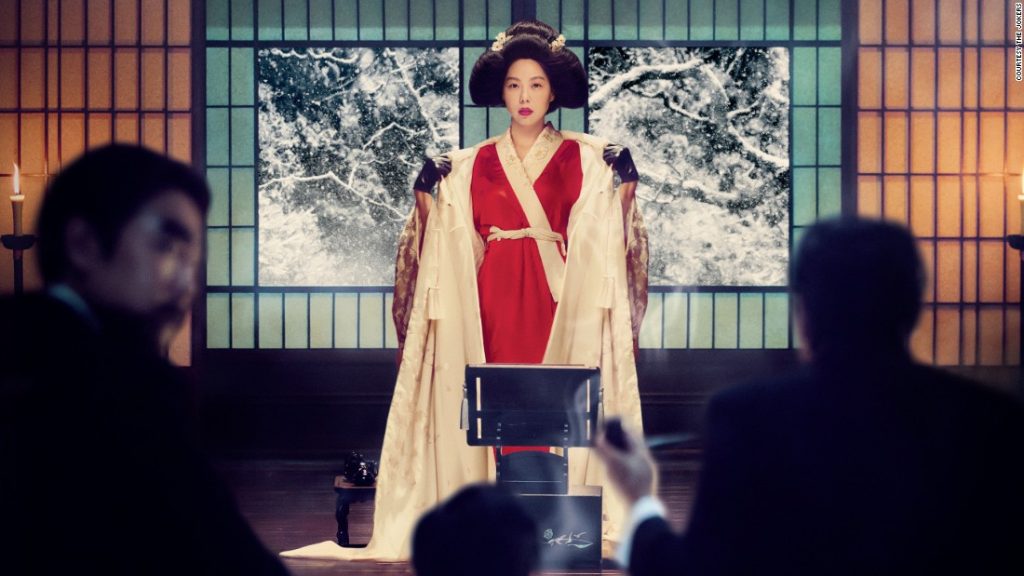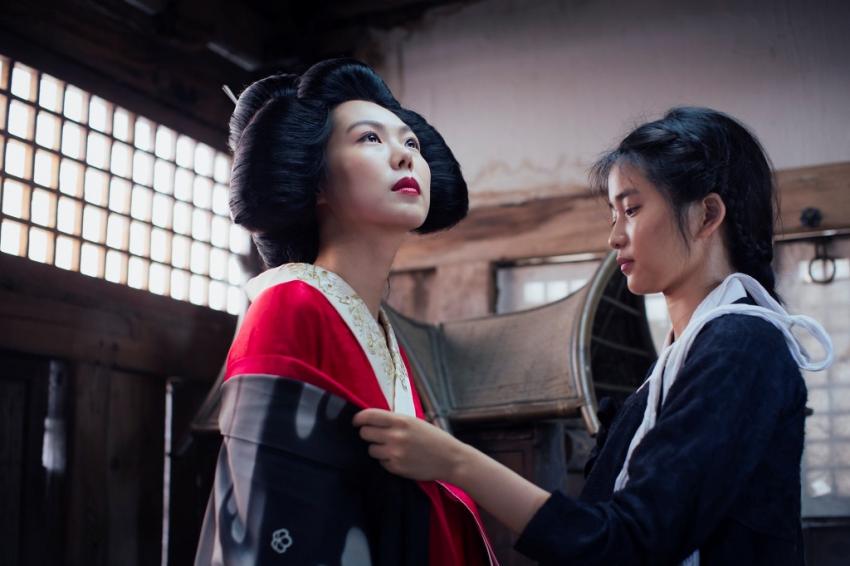 Title: The Handmaiden | Rated: Not Rated | Runtime: 144 min | Theaters limited (expanding)
Title: The Handmaiden | Rated: Not Rated | Runtime: 144 min | Theaters limited (expanding)
It seems like 2016 is the year that South Korean cinema struck hard after being somewhat dormant for years. While the nation has released a few gems such as New World and Snowpiercer in recent memory, it also tends to churn out plenty of melodramatic fare like Ode to My Father or nationalistic rubbish like The Admiral: Roaring Currents. Some time have passed since a great South Korean film capable of taking the world by storm arrived, so that there are quite a couple in 2016 is nothing short of wonderful. Auteur Park Chan-wook arguably placed his country on the cinematic map in the early 2000s with films like Sympathy for Mr. Vengeance and Oldboy (which is the South Korean masterpiece, in my opinion), and for him to emerge once more in this touchstone year with his first Korean film since 2009’s Thirst feels like destiny. The Handmaiden, adapted from Welsh writer Sarah Waters’ novel Fingersmith, does deflate a bit in its third act, but there’s no denying that it’s a hell of a ride that is as riveting as it is lavishing, as hilarious as it is acute, and as elegant as it is intoxicating.
 In 1930s Japanese-occupied Korea, a young pickpocket named Sook-hee (Kim Tae-ri) becomes the handmaiden to the beautiful yet emotionally fragile Japanese heiress Hideko (Kim Min-hee), who is expected to marry her domineering and perverted uncle Kouzuki (Cho Jin-woong), a Korean who has embraced a Japanese identity. However, Sook-hee is not at the mansion to simply be at their beck and call; her purpose is to convince Hideko to marry Count Fujiwara (Ha Jung-woo), a con artist in disguise who plans to consign Hideko to an asylum in order to seize her wealth. As the con is set into motion, Sook-hee can’t help but have sympathy toward Hideko, whom Kouzuki forces to regularly read aloud from his extensive and prized collection of Japanese erotica before an audience of progressively excited buyers. Sympathy then begins to give way to attraction, and soon, Sook-hee finds herself falling in love with Hideko, who so happens to return her affections.
In 1930s Japanese-occupied Korea, a young pickpocket named Sook-hee (Kim Tae-ri) becomes the handmaiden to the beautiful yet emotionally fragile Japanese heiress Hideko (Kim Min-hee), who is expected to marry her domineering and perverted uncle Kouzuki (Cho Jin-woong), a Korean who has embraced a Japanese identity. However, Sook-hee is not at the mansion to simply be at their beck and call; her purpose is to convince Hideko to marry Count Fujiwara (Ha Jung-woo), a con artist in disguise who plans to consign Hideko to an asylum in order to seize her wealth. As the con is set into motion, Sook-hee can’t help but have sympathy toward Hideko, whom Kouzuki forces to regularly read aloud from his extensive and prized collection of Japanese erotica before an audience of progressively excited buyers. Sympathy then begins to give way to attraction, and soon, Sook-hee finds herself falling in love with Hideko, who so happens to return her affections.
Simply put, this is a carefully and – for the most part – smartly structured film. I haven’t read Waters’ novel, so I can’t say what is from the source material and what is a creative liberty that Park and co-writer Chung Seo-kyung take, but what I can say that the film is plotted in such a dizzying and engaging way. Separated into three distinct acts, the story is full of twists and turns, keeping us laser-focused on the proceedings and delightfully making its long runtime go by rather breezily (film editors Kim Jae-bum and Kim Sang-beom too deserve credit for their stellar work here). The first act follows the Sook-hee’s perspective, and the second retells it and then some from Hideko’s before the third serves as the culmination of everything that comes before it. Park and Chung deftly establish their characters and the world in the first act, only to flip almost everything we know upside down and further flesh out the characters and their relationships in the second. These two acts work wonderfully with their distinct tones and reveals, and the second in particular soars. While the third act is by no means disappointing, it can’t help but feel like a step down for reasons I’ll address momentarily. Also, the dialogue that Park and Chung craft here is absolutely killer; though it gets over the top here and there, it does prove key in framing a character, moment, or act in relation to the overall picture.
 The film’s structure also extends to its themes. Though the themes generally run across the whole film, I would argue that each act focuses on a particular one. The first is dedicated to the development of a lesbian love story; the second tackles the male gaze – how it influences pornography, leads to the objectification of women, and the havoc it wreaks on the female psyche; the third is geared toward female empowerment and liberation. Again, it must be said how incredible the second act is, and its power really comes down to how Park brilliantly skewers the male gaze (he does engage in it too in a few scenes, though it’s fair to say that he certainly recognizes its inherent danger) by bringing us completely into Hideko’s mind. The film also touches upon the Japanese occupation of Korea in a few scenes, but it’s generally left on the sidelines for the other themes to develop, though we do get a visual reminder of it with the subtitle colors (white for Korean dialogue, and yellow for Japanese).
The film’s structure also extends to its themes. Though the themes generally run across the whole film, I would argue that each act focuses on a particular one. The first is dedicated to the development of a lesbian love story; the second tackles the male gaze – how it influences pornography, leads to the objectification of women, and the havoc it wreaks on the female psyche; the third is geared toward female empowerment and liberation. Again, it must be said how incredible the second act is, and its power really comes down to how Park brilliantly skewers the male gaze (he does engage in it too in a few scenes, though it’s fair to say that he certainly recognizes its inherent danger) by bringing us completely into Hideko’s mind. The film also touches upon the Japanese occupation of Korea in a few scenes, but it’s generally left on the sidelines for the other themes to develop, though we do get a visual reminder of it with the subtitle colors (white for Korean dialogue, and yellow for Japanese).
Park’s prowess as a filmmaker is on full display here, and he’s clearly having fun engaging his audience’s sensibilities, even if he is guilty of overindulging. By having the camera assume Sook-hee and Hideko’s points of view, he makes their attraction to each other tangible. When Sook-hee is filing down Hideko’s tooth with a thimble or observing her eat one grain of rice at a time, such moments – filmed in extreme close-up shots that linger on the subjects – take us into their minds and experience what they do, from time seeming to slow down to the hitches in their breaths. Is Park fetishizing? Sure, but the point is that we’re experiencing lust from the characters’ perspectives and thus understanding their emotions. Park is well known for grossing out moviegoers with his depictions of violence (the tooth extraction in Oldboy, the neck snap in Thirst), and this film is no different. However, this marks the first time where such violence – which occurs in the third act – is jarring and doesn’t fit with the rest of the picture. I won’t mention the scene in question to avoid spoilers, but it feels like an afterthought because it doesn’t really connect to the theme of female empowerment and liberation. It’s as if Park realized toward the end that no one has spilled blood from physical suffering, and he thereby decided to throw one in there because he’s known for it.
 For all the dark and oftentimes disturbing material at play here, The Handmaiden is incredibly and surprisingly hysterical. Park wants his audience to have fun watching the film, and he frequently cuts through the drama with sudden flashes of comedy. Yes, there are some great lines here, but they’re funny because they’re exaggerated. Here, the comedy is predominantly visual, relying on what is happening within the frame and striking when we least expect it. An action precisely occurs at a cut or after a camera movement, and seeing the characters react with surprise that matches ours is simply hilarious. Kudos to the cast, who command the scenes with these actions, whether it be Hideko running across the frame while screaming or Fujiwara unexpectedly forcing Sook-hee’s hand to his crotch.
For all the dark and oftentimes disturbing material at play here, The Handmaiden is incredibly and surprisingly hysterical. Park wants his audience to have fun watching the film, and he frequently cuts through the drama with sudden flashes of comedy. Yes, there are some great lines here, but they’re funny because they’re exaggerated. Here, the comedy is predominantly visual, relying on what is happening within the frame and striking when we least expect it. An action precisely occurs at a cut or after a camera movement, and seeing the characters react with surprise that matches ours is simply hilarious. Kudos to the cast, who command the scenes with these actions, whether it be Hideko running across the frame while screaming or Fujiwara unexpectedly forcing Sook-hee’s hand to his crotch.
Of course, none of this would matter had the characters and their relationships been boring, and thankfully, they’re far from it. Both Sook-hee and Hideko are compelling, and that they challenge and inspire each other despite being from completely opposite backgrounds and upbringings makes their relationship a dynamic one that seizes our attention and refuses to let go. Indeed, because we invest in their relationship, their kinky sex scenes feel honest and tender, though there is one such sequence towards the end that’s overdone. Fujiwara’s craftiness and persistence go a long way, and just when we think we know what drives him, he proves that he has some surprises in store. Kouzuki may come across as a caricature, but he has a fascinating history. By no means is he a sympathetic character, but he sure is a captivating one to watch. There are a number of minor characters in the story, and when the film can’t develop them fully, it does leave plenty of suggestive hints in their relationships, demonstrating strong character economy. The role of the cruel housekeeper Sasaki (Kim Hae-sook) is small, but her relationships with Kouzuki and Hideko are enough to make her riveting. Ditto for Hideko’s aunt (Moon So-ri), who – as shown in flashbacks – turns out to be an influential figure in her niece’s life, even though her lines are minimal.
 A stellar cast brings these characters to life, delivering brilliant and confident performances. Kim Tae-ri is a revelation, holding her own against her more experienced co-stars. Sook-hee is a challenging character to tackle – especially for a newcomer like Kim – due to her duplicity, but the actress nails both the seeming innocence and spunk. Also stunning is Kim Min-hee, who commands the frame with curiosity, mystery, and a soft-spoken authority. She has quite a number of physical scenes (I refer to her live erotica readings), and she knocks those moments out of the park with breathtaking impassivity. Ha is an utter delight in his role, exaggerating his actions and demeanor in order to play it smooth while maintaining a condescending air. Just when we think that Kouzuki can’t get any more perverted or sleazier, he does, and Cho relishes any opportunity to bring every ounce of unpleasantry to the surface.
A stellar cast brings these characters to life, delivering brilliant and confident performances. Kim Tae-ri is a revelation, holding her own against her more experienced co-stars. Sook-hee is a challenging character to tackle – especially for a newcomer like Kim – due to her duplicity, but the actress nails both the seeming innocence and spunk. Also stunning is Kim Min-hee, who commands the frame with curiosity, mystery, and a soft-spoken authority. She has quite a number of physical scenes (I refer to her live erotica readings), and she knocks those moments out of the park with breathtaking impassivity. Ha is an utter delight in his role, exaggerating his actions and demeanor in order to play it smooth while maintaining a condescending air. Just when we think that Kouzuki can’t get any more perverted or sleazier, he does, and Cho relishes any opportunity to bring every ounce of unpleasantry to the surface.
This is an evocative and gorgeous picture, and its elements are crafted so exquisitely. Cinematographer and frequent Park collaborator Chung Chung-hoon moves his camera with elegance and purpose, serving the characters first and foremost as he captures every flash of emotion demonstrated through their actions, facial expressions, and body language. Ryu Seong-hie’s production design shines, showcased in both Kouzuki’s English-Japanese architecture and the darkened yet lavish interiors, with the latter always hinting that something secret or sinister is going on. Cho Sang-gyeong’s beautiful costumes, coupled with Song Jong-hee’s terrific hair and makeup work, ensure that the characters are dressed to kill. Composer Jo Yeong-wook’s multifaceted score enhances the mood in any scene, and certain tracks bring to mind Harry Escott’s melancholy work in Shame and the theme that Alexandre Desplat composed for The Imitation Game – both of which are films that share similar themes with this one.
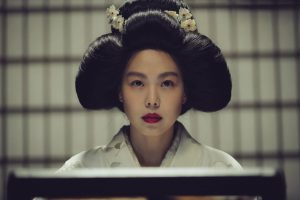 Park’s return to South Korean cinema has resulted in not just a return to form for the auteur, but also arguably the third best work in his filmography. Despite his overindulgence, what we’re seeing here is a master filmmaker – who has the complete commitment and trust from his cast and crew – using every filmmaking technique and trick up his sleeve to set into motion an engrossing, tangible story that ensnares our attention. I dare you to look away.
Park’s return to South Korean cinema has resulted in not just a return to form for the auteur, but also arguably the third best work in his filmography. Despite his overindulgence, what we’re seeing here is a master filmmaker – who has the complete commitment and trust from his cast and crew – using every filmmaking technique and trick up his sleeve to set into motion an engrossing, tangible story that ensnares our attention. I dare you to look away.
Rating: 4.0/5.0
* Photos courtesy of Amazon Studios

